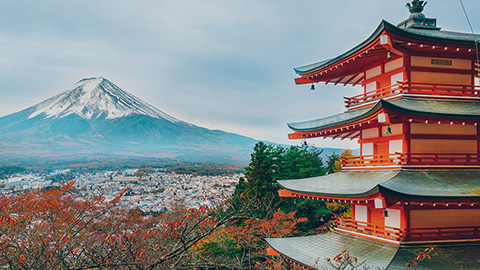May 2023
Japan’s Startup Visas for Foreign Entrepreneurs Spur Innovation, Economic Renewal
March 2023

At an orchard in northern Japan, a self-driving cart slowly winds its way through the trees, hauling baskets of apples from picking areas to sorting stations. The size of a child’s hand-pulled wagon, the cart, dubbed Adam, is a prototype agricultural robot that can carry up to 200 kg (440 pounds) at a time.
Apple growers in Aomori Prefecture who have tested Adam say the robot has the potential to solve one of the biggest challenges facing the country’s agricultural sector: a severe shortage of farmworkers.
With knobby wheels, electronic eyes, artificial intelligence and other high-tech gadgetry, Adam resembles robots of an interplanetary kind––NASA’s remote-controlled rovers on the surface of Mars. That’s no accident. The cart combines Japanese-made machine parts and state-of-the-art robotics engineering and technologies that are similar to what’s inside planet-exploring rovers, said Israeli-American roboticist and inventor Tamir Blum.
Blum is the founder of Kisui Tech![]() , a startup based in Sendai City, Miyagi Prefecture. He worked at Space X, Elon Musk’s rocket and satellite company, and U.S. defense contractor AeroVironment, before coming to Japan to get a PhD in robotics at Tohoku University, in Miyagi. It was the opportunities and resources he discovered in Japan that led to his decision to launch Kisui Tech in 2021. “We’re using technology to improve livelihoods, especially for people in rural areas, and create a more sustainable planet,” said the 29-year-old Blum.
, a startup based in Sendai City, Miyagi Prefecture. He worked at Space X, Elon Musk’s rocket and satellite company, and U.S. defense contractor AeroVironment, before coming to Japan to get a PhD in robotics at Tohoku University, in Miyagi. It was the opportunities and resources he discovered in Japan that led to his decision to launch Kisui Tech in 2021. “We’re using technology to improve livelihoods, especially for people in rural areas, and create a more sustainable planet,” said the 29-year-old Blum.
The goal, said Blum, is to empower farmers to do more with fewer people. In many industries, innovative ideas like Blum’s can't come soon enough. Japan is attempting to strengthen its global competitiveness, even with a workforce that is shrinking and aging. Roughly 30 per cent of the country’s population is 65 or older.
In 2021, only 1.3 million people, or 1 per cent of the country’s 125.5 million, cited farming as their main occupation, and the average age of farmers was around 68. In a sector that’s dominated by small-lot, family-run operations, many farmers are now turning to drones, robots, sensors and cloud-based data to boost efficiency and productivity and maintain the supply of high-quality food that the country’s consumers have come to expect. It has also become the country’s main attraction for inbound tourists.
Blum is part of a growing influx of entrepreneurs from abroad who are bringing much-needed expertise and innovation. They’re starting businesses that build smartphone apps, operate coding cram-schools and add virtual and augmented reality to videogames, injecting new vitality into the world’s third-largest economy.

Startup Visa’s Relaxed Requirements
For many of these foreign entrepreneurs, Japan’s Startup Visa was the crucial first step to getting their ventures off the ground. Since 2015, the Government of Japan’s Startup Visa has allowed would-be entrepreneurs to stay in Japan for six to 18 months while they set up a business. So far, Japan has designated 22 municipalities* from Fukuoka to Kyoto, Sendai, and Hokkaido, including those within national strategic special zones, where it’s hoping to encourage more foreigners to open a business. The Startup Visa relaxed the strict requirements for raising funds (5 million yen, or US38,000 dollars) and hiring employees (at least two) that had made getting a Business Manager Visa so difficult. Startup Visa holders can stay in Japan for six months to meet such requirements and prepare for launching their new business. In some municipalities, a further 6- to 12-month extension is available if the municipal government approves their progress toward opening a business.
* As of February 2023
To demystify the visa process, the Japan External Trade Organization (JETRO)––the government agency whose mission is to facilitate investments from abroad and open doors overseas for Japanese businesses––offers assistance to applicants through its local offices in Kyoto and Kobe. Some municipal governments have set up programs to help with the application process. “Starting a company was hectic, and there was a lot of paperwork,” said Blum. “But I joined Sendai City’s Tohoku Growth Accelerator Program and had an online checklist of how to start a company, which made it easier.” Being aware of the regulations and required documents and getting help from a Japanese native helped, he said.
Japan’s Startup Visa is part of a broader set of policy initiatives aimed at enticing overseas professionals. Universities, businesses and local governments are working together to expand job opportunities in Japan for international students from Japanese universities. The government recently announced the creation of a new system to open the door to foreign professionals further. Soon, engineers with an annual salary of 20 million yen (approximately US152,000 dollars) or over with specified work experience or academic degrees can apply for permanent residence after one year in Japan. Graduates from top-ranked overseas universities can stay in Japan for two years for a job search or to start a business. Also, government ministries and municipalities are upgrading multilingual public services and improving education opportunities and medical services to make it easier for foreigners to acclimate to their new surroundings.

Japan’s Farm Tech Future
For Kisui Tech’s Blum, building a world-class robotics team of six from scratch hasn’t taken long. In Sendai, he drew on a support network of legal and other services; and secured US700,000 dollars from angel investors and public subsidy programs. Recently, Kisui Tech opened a development office in Chiba Prefecture, neighboring Tokyo.
Despite relatively lower salaries in Japan than in other countries, Blum is confident that he can continue recruiting top robotics talent from overseas with exciting prospects for work; housing and health insurance costs that are far lower than in the US; and a food culture that has influenced the world’s top chefs and restaurants.
In trials at an orchard in Aomori, Blum’s prototype robot, Adam, has increased the efficiency of harvesting 5,000 kg (5.5 tons, US) of apples per day by 33 per cent. Farmers like Adam’s size, which is compact enough for them to load it onto their mini-pickups, known as kei-trucks, a mainstay of Japan’s countryside. By 2024, Kisui Tech aims to begin delivering the first of 20 to 30 Adam robots to farmers, and future versions of the company’s robots could one day monitor the growth of the fruit, detect diseases and alert growers about trees that are ready for picking.
Blum has even bigger dreams. “If we can tackle some of the more difficult and expensive tasks like trimming the trees and harvesting the apples, then basically the entire farm can be automated,” he said. As more entrepreneurs like Blum find their calling in Japan, it’s hard not to get excited about the country’s future prospects.
FACT BOX
Japan’s Startup Visa Procedure:
- Applicants must submit their documents along with a business plan in Japanese to a municipal government with a Startup Visa program.
- After approving the application, the municipal government issues a Certificate of Confirmation of Business Startup Activities. This certificate must then be submitted to the Immigration Services Agency along with an application for residency.
- After approving the applicant’s residency status for “designated activities,” the Immigration Services Agency issues a six-month visa.
- In some municipalities, after the initial six-month visa period, the applicant can submit documents to the municipal government to extend the visa for another six to 12 months.
Learn More
Contact Us
Investing in and collaborating with Japan
We will do our very best to support your business expansion into and within Japan as well as business collaboration with Japanese companies. Please feel free to contact us via the form below for any inquiries.
Inquiry FormJETRO Worldwide
Our network covers over 50 countries worldwide. You can contact us at one of our local offices near you for consultation.
Worldwide Offices

































